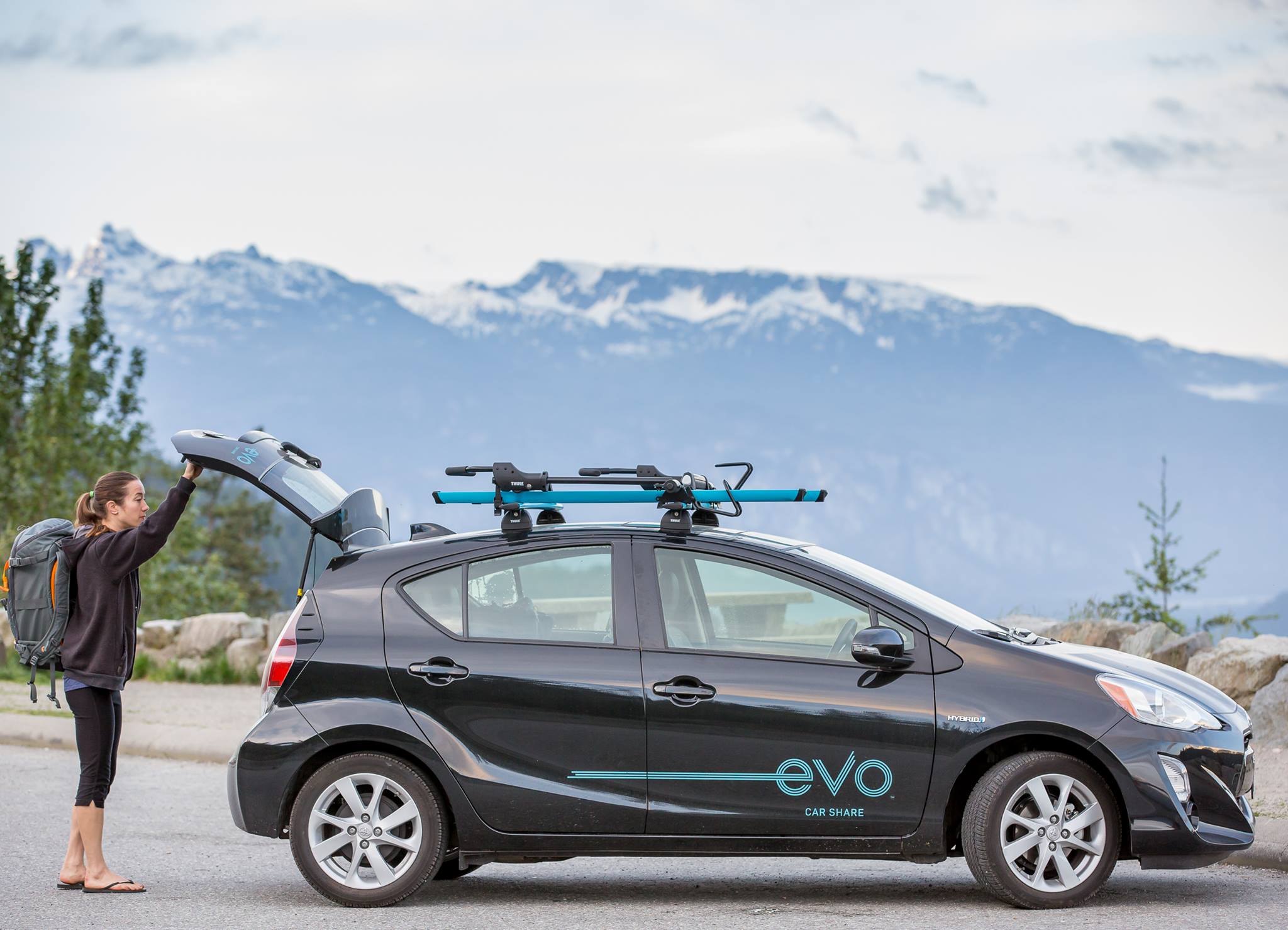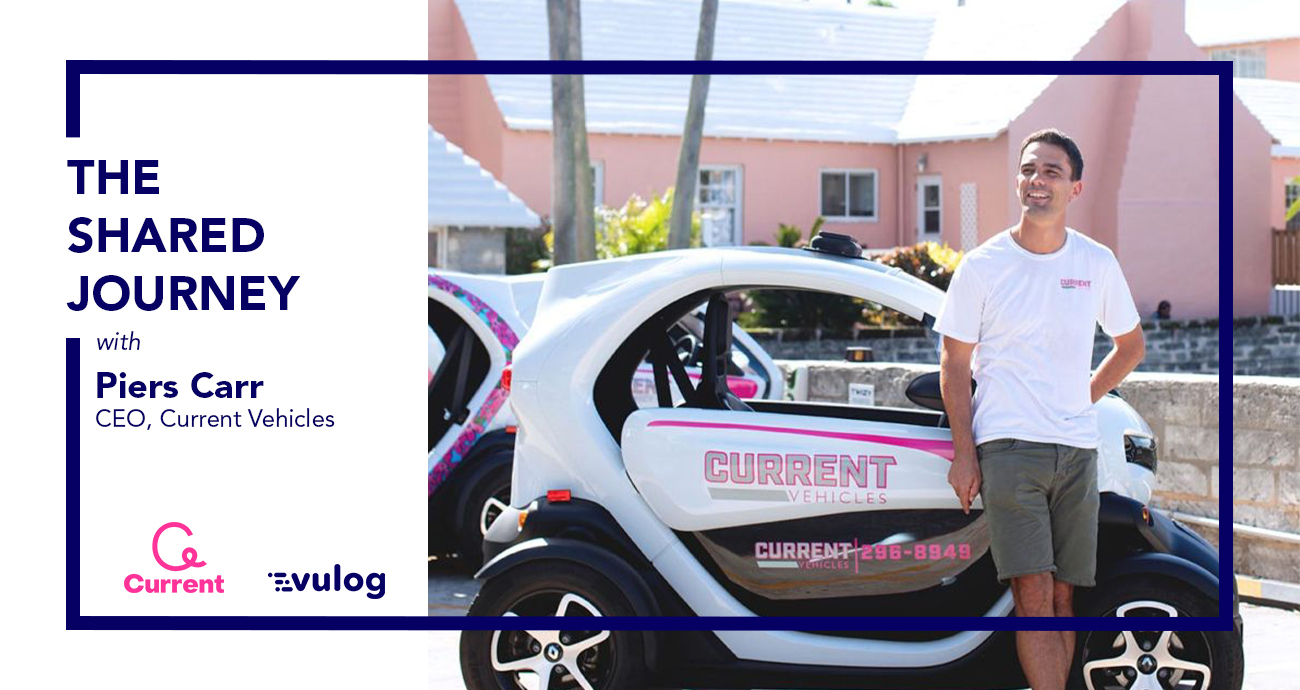- Solutions
- Clients
-
Technology
Technology
- Insights
-
Company
Company
- Contact Us
The Shared Journey: The hottest way to travel in Tahiti!
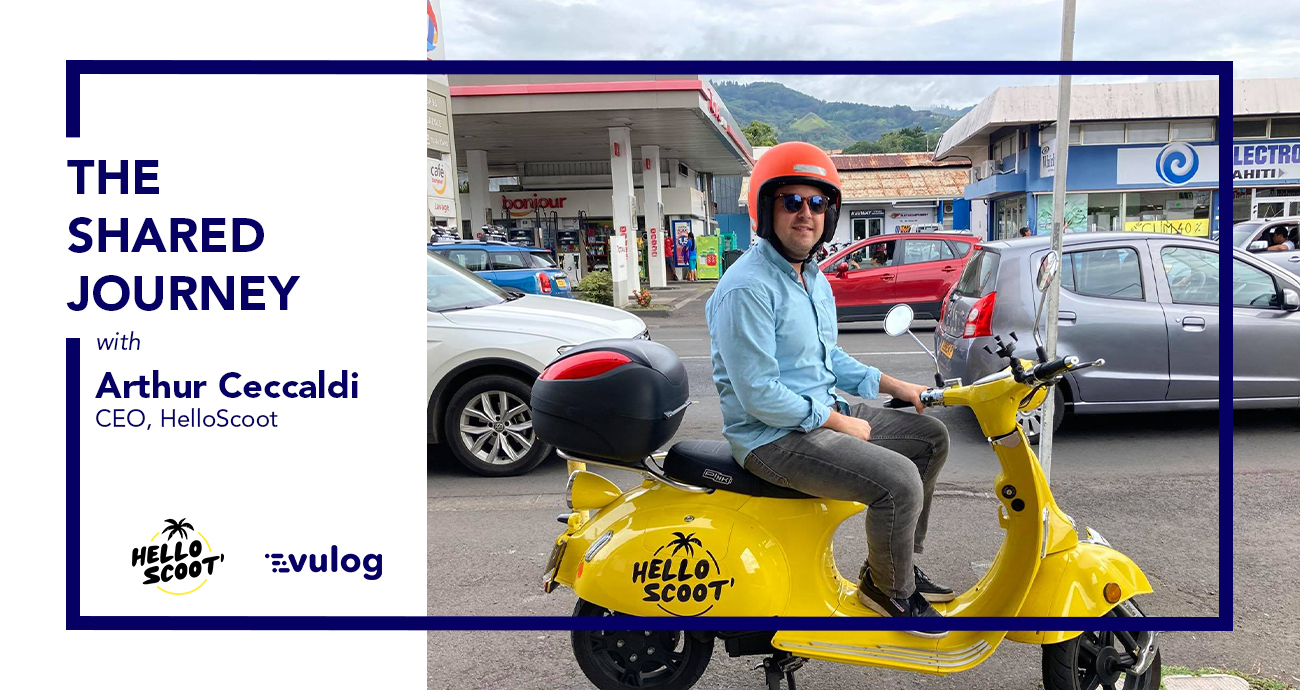
Exclusive insights from Hello Scoot' CEO, Arthur Ceccaldi on launching moped-sharing on an island.
Dreaming about launching an island-based shared mobility service? Arthur Ceccaldi, CEO of Hello Scoot', shares his insights into how he made this dream come true by collaborating with local officials and soaking up solar energy.
Tell us a bit more about Hello Scoot’. Where did you get the idea? What motivated you to get involved in shared mobility in the first place? And why Tahiti?
My wife is Tahitian, so she and I moved here a year and a half ago. One of my goals when we moved here was to create a new, innovative project which would reflect the values and culture of Polynesia.
The administrative and economic center of Polynesia is Papeete, and with about half a million daily trips, the city faces many issues such as congestion, lack of parking spaces, noise, pollution, etc. While there is currently a bus network, multiple stops were only just implemented last year. So, although public transport is growing overall, there are still very few viable alternatives to private cars.
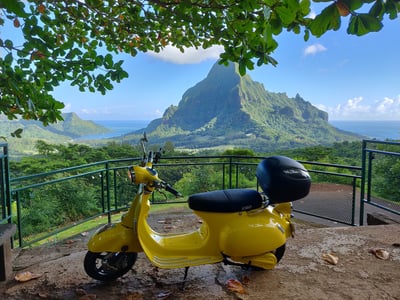 When it came time to choosing a vehicle for our shared mobility service, the moped seemed like the perfect fit for the city for several reasons including the sunny weather, the average trip length, etc. Having spent most of my life in Paris, I watched the city embrace and integrate various shared mobility initiatives (moped, bicycles, scooters) and so I was inspired to do the same thing in Tahiti but with a Polynesian twist.
When it came time to choosing a vehicle for our shared mobility service, the moped seemed like the perfect fit for the city for several reasons including the sunny weather, the average trip length, etc. Having spent most of my life in Paris, I watched the city embrace and integrate various shared mobility initiatives (moped, bicycles, scooters) and so I was inspired to do the same thing in Tahiti but with a Polynesian twist.
Another driving factor for this project was my passion for the environment. We charge all of our mopeds using solar energy and operate a solar power station that supplies our offices, air conditioning, and computers, while allowing us to charge all of our mopeds’ batteries. In this way, we are quite self-sufficient: we produce our own green electricity, which we use to charge our emission-free mopeds, and people can ride them to get around wherever they need to go. Our service is, therefore, an excellent mobility solution that addresses a dire need for sustainable transportation.
Would you consider the island of Tahiti advanced in terms of mobility projects?
No, we have very few viable shared mobility options although there are some initiatives around mobility such as mapping to help people with reduced mobility, tuk-tuks, and digital keys offered by rental agencies. All of this is quite small scale though, and today, there’s no comprehensive solution that offers a fully optimized, digital, fast, and efficient customer experience.
How has it been working with local authorities? Have you collaborated closely together?
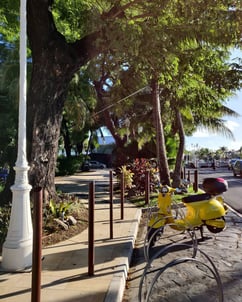
Yes, we have – collaborating with local authorities has been essential, because shared mobility can’t be integrated into public space without the help of authorities to create the solid framework it needs to function efficiently. We got in touch with the Ministry of Transport, the Transportation Directorate, and local authorities - including the Papeete Town Hall - who gave us permission to park mopeds around town.
We also work with private partners who let us label some of their parking spots with our brand name, so that our clients have dedicated parking. This is important, because we’re trying to develop a sort of hybrid between a free-floating service and dedicated parking spaces to give users more freedom.
In addition to all of this, two other factors helped us really kick off Hello Scoot’: we won second prize in the 2019 Tahiti Tourism Competition, which helped us launch our funding phase. And we joined the PRISM incubator launched by the Tahiti Chamber of Commerce which increased our visibility and helped expand our network of contacts.
What are some of the challenges and opportunities of launching and operating a shared mobility service on an island?
We were actually the first to bring electric mopeds onto the island. So even though, today, some stores are starting to sell them, acquiring mopeds was a big challenge for us when we started our project. This meant that, in addition to being a shared mobility operator, we also had to start importing vehicles, run our own garage shop in order to handle maintenance, run diagnostics, ensure that replacement parts are always in stock, train new recruits, etc.
Another challenge is the fact that Tahiti is an island, so the rate at which business runs is contingent upon the schedules of cargo ships, planes, and boats. In the end, we’re so far away from everything! It’s a 5-hour flight from New Zealand, 10 hours from Australia, 12 hours from Los Angeles, so the cost of freight shipping has a huge impact on our business when it comes to importing mopeds and parts. If all goes well, it takes us about four months to get the parts we need by sea. Therefore, having extremely accurate inventory management is key.
Nevertheless, these inconveniences can also present opportunities. Given the unique circumstances that come with living on an island plus our line of business, Hello Scoot’ has the competitive advantage of playing several major roles here as an importer, a shared mobility operator approved by the land transport authority, we could even become an official vehicle supplier if we wanted to! On top of all this, we have a garage shop that is specialized in EVs and thanks to Vulog’s tools we have extensive knowledge of fleet management which makes us really stand out. This combination of knowledge and resources allows us to operate a fleet of electric mopeds today and will equip us with the tools we need in the future to expand to other types of vehicles (cars, bicycles, and scooters), and nearby territories. The possibilities are endless which is all very exciting!
One of your slogans, “Moped rentals have never been so trendy,” is reflected by your choice of retro mopeds: was this a deliberate choice?
It was important for us to have a moped that reflected local habits and culture. People here are huge fans of the Vespa, that’s why we decided to use them as part of our “Hello Scoot’ x Pink Mobility” collaboration – the vehicle really resonates with locals. Lots of people actually want to buy them when they stop by the shop, so that says a lot!
Who is your main target audience? Tourists, locals?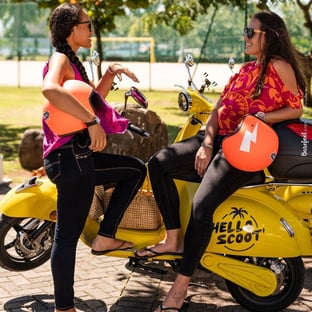
In Tahiti, the market is rather small. We target young professionals who are between 25 and 40 years old, who own a car but are concerned about the environment, who aren’t afraid to try new things and, of course, are addicted to their smartphones!
Due to the Covid crisis, we have been targeting locals since there are very few tourists. I’m convinced that - pandemic or no pandemic - a service should always address the needs of locals. People need to get from one place to the next, and they need reliable alternatives that complement public transportation.
When life get back to normal, we can take things one step further and target tourists such as couples that are backpacking through the island or those people who come over to Tahiti for a couple of nights before hopping on over to other islands. What’s great about our mopeds is that they can accommodate two people (with room for two helmets).
In your line of business, is the B2B market worth exploring? If so, why?
There are three main types of companies in Tahiti that could use our services. Self-employed entrepreneurs, who work alone or with just one or two people. They don’t need an actual fleet, but they can use our mopeds to get around more easily, without having to deal with traffic jams or waste time looking for parking spots.
Next, there are small to medium-sized businesses which often already have mopeds at their headquarters, but theses businesses lack the practical knowledge and/or experience needed to understand how shared mobility works, keep track of keys, etc. Their typical use case would be something like: “We need a moped for a quick, easy, and billable daytime business trip without having to worry about anything else.”
Finally, you’ve got the big companies based in urban areas around Papeete. Some of them operate fleets for business trips, but our solution can be convenient for personal errands such as going out to lunch, to see the doctor, dropping off documents, running errands, etc.
When it comes to taking care of your vehicles - cleaning, redistribution, etc. - do you handle these kinds of operations internally or do you outsource?
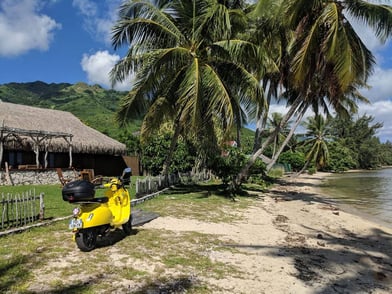 Right now, everything is being taken care of internally simply because our business is the first of its kind on the island and so finding the right contractors isn’t easy. We take it upon ourselves to train people, so they have a solid understanding of what we do: from the very basics of fleet management to the logistical tasks involved with running and maintaining fleet vehicles.
Right now, everything is being taken care of internally simply because our business is the first of its kind on the island and so finding the right contractors isn’t easy. We take it upon ourselves to train people, so they have a solid understanding of what we do: from the very basics of fleet management to the logistical tasks involved with running and maintaining fleet vehicles.
In terms of moving around, we have an electric van that we use to travel from our office to areas across the home zone. We also have an electric bike with a trailer that lets us move our mopeds around from one area to the next. One key aspect of our business model is that we use removable batteries that can be collected and charged at night. This means charging takes place in one centralised location. Plus, they charge very quickly, using green energy.
Although we haven’t found any local service providers yet, we’re optimistic that as the market expands and our moped sales continue to increase, enthusiasm for electric, shared mobility will grow exponentially as well!
Your offer is based on a fixed fee per minute. What type(s) of use cases/trips are you targeting with this kind of price offering?
Our main target is people living in the city who have short commutes (to get to work, to run errands, etc.) but who won’t want to use a car. There is a real need for these kinds of short, simple trips that tend to be 2km or so, because they are taken on a daily basis within the city. The financial breakdown is straightforward - a trip via our shared mobility service is just slightly over the cost of a bus ticket yet below the cost of taking a taxi.
When it comes to pricing, have you thought about offering daily or hourly fees? Are you considering special rates for residents or tourists?
For the time being, we are focused on changing people’s mentalities regarding mobility in general, and this starts with per-minute offers simply increasing our visibility. In recent months we’ve hired a number of staff who are very environmentally conscious and excited to get our service up and running! Our staff are the best ambassadors for our service, especially in Tahiti where word-of-mouth is extremely important. There’s nothing more powerful than a personal recommendation – when someone encourages you to test out a new service that they themselves very much appreciate. The next step would, therefore, naturally be to create a loyalty program and grow its reach with the help of local influencers.
What does the future hold for Hello Scoot’?
There are three main areas of development for Hello Scoot’. The first is offering multi-use services by adding bikes, scooters, cars, even boats. This means being able to order taxis or tuk-tuks directly via the app, check bus timetables, buy tickets, etc. The second is to promote electric mobility with solar charging, which is a truly environmentally friendly alternative to other forms of energy. And the third is to expand to other cities in Polynesia. Many people travel between the islands here, for work or for vacation, so offering a multi-island, multi-city, multi-use service could be a very attractive concept to locals (and tourists)!
Want to learn more? Check out Hello Scoot's website


